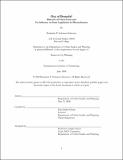Out of bounds? : rhetoric of urban form and its influence on state legislation in Massachusetts
Author(s)
Solomon-Schwartz, Benjamin Peretz
DownloadFull printable version (2.114Mb)
Alternative title
Rhetoric of urban form and its influence on state legislation in Massachusetts
Other Contributors
Massachusetts Institute of Technology. Dept. of Urban Studies and Planning.
Advisor
Ezra Haber Glenn.
Terms of use
Metadata
Show full item recordAbstract
Urban form is the product of the actions of a multitude of actors, from governments to individuals, from corporations to activist organizations. It is the result of rules, ideas, assumptions,and arguments, all of which accumulate and evolve over many years. Among these many paths of influence, urban form is the outcome of state policy, including the laws of the Commonwealth of Massachusetts. In turn, state policy is a product of multiple objectives and is shaped, often indirectly,by shared ideas about urban form. In order to understand the ways in which policy and form are intertwined, this thesis explores the influence of ideas about urban form on three recent state laws in Massachusetts: the Community Preservation Act from 2000, 40R/40S (Smart Growth Zoning and Housing Production) from 2004 and 2005, and landlocked tidelands legislation from 2007. Each law has plausibly significant impacts on urban form, but urban form is not the driving factor in any of these cases. In each case study, rhetoric of urban form emerged indirectly in the discussions about the legislation. The prevalence of this rhetoric indicates that it was essential that the legislation be consistent with shared conceptions of the urban forms native to Massachusetts. These ideas of vernacular form are dominated by the idea of New England village, but also include a secondary urban vernacular that is applied to select urban locations. Each piece of legislation had to be consistent enough with an idea of vernacular urban form so that it could be presented and advocated in terms of the vernacular. (cont) Chapter three explores the variety of paths along which ideas of the vernacular form operate in each case study.This analysis of the ways that ideas about urban form shape state legislation suggests lessons that could improve the physical setting of the Commonwealth. Ultimately, the lessons have the potential to positively influence the lives of the Commonwealth's inhabitants, workers, and visitors.
Description
Thesis (M.C.P.)--Massachusetts Institute of Technology, Dept. of Urban Studies and Planning, 2008. This electronic version was submitted by the student author. The certified thesis is available in the Institute Archives and Special Collections. Includes bibliographical references (p. 66-69).
Date issued
2008Department
Massachusetts Institute of Technology. Department of Urban Studies and PlanningPublisher
Massachusetts Institute of Technology
Keywords
Urban Studies and Planning.